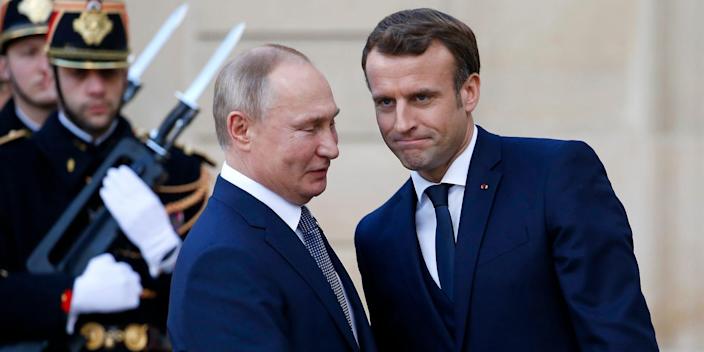
-
French President Emmanuel Macron is set for a rematch against far-right opponent Marine Le Pen.
-
Before Sunday’s first-round election, his lead began to shrink and he’s now in a competitive race.
-
Experts told Insider that Macron’s approach to Putin hurt his campaign but helped Le Pen’s.
In just over two weeks, French President Emmanuel Macron fumbled a comfortable lead and is now nearly tied with far-right challenger Marine Le Pen in head-to-head polling.
The pair are slated for a rematch after securing the top two spots in Sunday’s first round election. Back in 2017, Macron beat Le Pen by more than 30 percentage points on his way to taking power with his newly formed centrist party.
This time around, while the 11 other candidates in the initial field were campaigning across the country, Macron stayed in statesman mode and prioritized direct diplomacy with Russian President Vladimir Putin to try to persuade Russia against attacking Ukraine. He also waited until the night before the March 4 deadline to officially declare his candidacy.
Although Macron briefly enjoyed a boost in his approval ratings ahead of Russia’s invasion of Ukraine in February — benefiting from a “rally ’round the flag effect” type of phenomenon where voters back a leader faced with an external crisis — his reelection prospects have gone from a safe bet to nearly a toss-up as Le Pen surged in the polls late in the race.
In French presidential elections, candidates from all parties can run in the first round and someone can win outright if they get over 50% of the vote, while the second round functions similarly to a US general election, but is decided by the popular vote instead of the electoral college. On Sunday, 12 candidates competed and Macron finished in first place with 27.8% of the vote, while Le Pen came in a close second with 23.1%, pitting them against each other for a rematch on April 24.
For Macron, focusing on diplomacy with Russia before and as the war in Ukraine has escalated may have helped Le Pen, who stuck to messaging on combatting inflation and the rising cost of living in France and avoiding culture war issues.
“Unfortunately, Macron’s nearly sole focus on France and Europe’s geopolitical position vis-à-vis Russia over the past few months had the unintended consequence of normalizing his opponent Marine Le Pen’s long-standing friendly relations with Putin and the Kremlin,” Heather Conley, president of the German Marshall Fund, told Insider in an email.
According to a FiveThirtyEight polling analysis, Macron’s lead over Le Pen is smaller than it’s ever been, with the far-right challenger rising to within the margin of error in polls that ask people to choose between the two, after losing to him by more than 30 percentage points in 2017.
While there has not been much issue-specific polling on the French president’s handling of the war in Ukraine, Macron is now in a weaker position for his reelection than he was before Russia invaded in late February, according to FiveThirtyEight’s polling average tracker. Macron’s approval rating has steadily recovered from its nadir in the 30 to 20 percentage point range in 2018 following the nationwide Yellow Vest protests, but the remainder of the campaign will determine whether he gets a second term.
Macron’s approval as of late March flattened out to 44% in Politico Europe’s rolling average, with 54% of French voters disapproving of his job performance.
‘Missing in action’


As Le Monde columnist Gilles Paris put it, Macron seemed to be “missing in action on the campaign trail” as he became increasingly preoccupied with the war in Ukraine. The French newspaper of record ran a rare front page cartoon mocking Macron for dedicating so much of his time to Putin, with the caption reading: “Vladimir, I’m just finishing with this chore and I’ll call you back.”
Conley explained that Macron began courting Putin “in earnest” starting in 2019 once the Trump administration and Russia ended a series of international arms control agreements.
Typified by the extremely long table separating Macron and Putin during their sitdown back in February, the French president’s efforts at persuading his Russian counterpart to end the war have resulted in memes and publicity, but not much in the way of concrete concessions.
Polish Prime Minister Mateusz Morawiecki delivered a scathing critique of Macron earlier this month, a rare dustup in what has otherwise been a unified response from western allies.
“Mr. President Macron, how many times have you negotiated with Putin, what have you achieved?” Morawiecki said at a press conference on April 4. “Have you stopped any of the actions that have taken place? One should not negotiate with criminals … Nobody negotiated with Hitler. Would you negotiate with Hitler, Stalin, Pol Pot?”
Macron continues to meet with Putin to negotiate a new nuclear arms agreement with Russia on behalf of Europe after the war, according to Conley. In a November 2019 press conference, Macron alluded to pursuing a new nuclear arms agreement with Russia and received implicit affirmation from Kremlin spokesperson Dmitry Peskov, who said that aside from the French president, there was “no response from our other partners. This forces us to take measures to counter these threats.”
Le Pen’s image makeover and Kremlin ties
One of Le Pen’s positions that could benefit Putin the most is her promise to remove French forces from NATO command and to embrace Russia as a “privileged partner” instead, a term used to describe a more favorable trade relationship with a non-European Union country. She also secured an $11.1 million loan from a Moscow-based bank in 2014 to fund her campaign.
Le Pen also met Putin in person at the Kremlin in March 2017, where she vocally supported Russia’s annexation of Crimea from Ukraine and Putin made a remark about not wanting to interfere in that year’s French presidential election. Le Pen’s ties to the Kremlin and willingness to act as a Putin sympathizer on the global stage has reportedly spooked some staffers in the Biden White House, according to a recent Politico report.
Macron has been more in favor of accepting refugees and generally much more critical of Putin in the past compared to Le Pen, but the combination of his push for man-to-man diplomacy along with a more skeptical posture toward the US as a world power has reduced the perceived gulf between the two candidates’ approach to Russia, Conley explained.
Ever since losing to Macron in 2017, Le Pen has also undergone a makeover of sorts, distancing herself from some of the more extreme positions on race and immigration that previously came to define her brand as the daughter of Jean-Marie Le Pen, the founder of the National Front party who has repeatedly diminished the severity of the Holocaust.
“She has normalized her image and persona, wearing pastel colors, talking about her life as a single mom, and breeding cats,” Célia Belin, a foreign policy visiting fellow at the Brookings Institute’s Center on the United States and Europe, told Insider in an email.
“Meanwhile, she has received tremendous help from Eric Zemmour, who obsessively pushed all the most radical ideas, excited the far-right, took all the most radical defectors away from her,” Belin continued. “So she now appears normal compared to his extreme righted-ness.”
Zemmour, a famous French public intellectual who achieved a new level of stardom on the right upon hosting a conservative TV news show, finished in fourth place on Sunday with just 7.1% of the vote after polling much higher during stretches of the campaign.
Former President Donald Trump also called Zemmour and told him to “never change,” according to the French candidate’s campaign. Zemmour advocated for mass deportations, construction of a European Union border wall, and called unaccompanied migrant children “robbers,” “murderers,” and “rapists.” He also campaigned in favor of a closer relationship between France and Russia with less reliance on the US.
The Economist’s election model currently gives Le Pen a 23% chance of beating Macron in the final round, about the same odds Trump had in FiveThirtyEight’s model in 2016.
Read the original article on Business Insider




